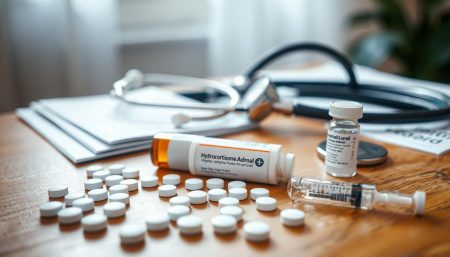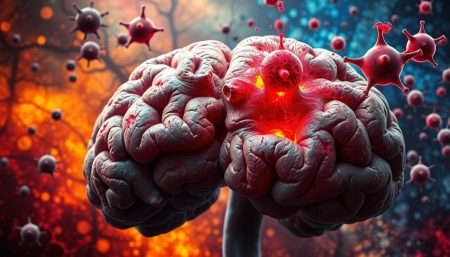Understanding our dogs’ health is crucial. Addison’s disease in dogs is a condition you might not know about. It’s also known as hypoadrenocorticism in dogs. This disease happens when the body doesn’t make enough important hormones.
This disease is caused by the adrenal glands not working right. Dogs need these glands to make hormones like cortisol and aldosterone. Without enough, dogs can act tired or stressed. Knowing about Addison’s disease in dogs is the first step to help your pet.
Key Takeaways
- Addison’s disease in dogs is a critical health condition requiring awareness and education.
- Canine hypoadrenocorticism involves a deficit in hormone production by the adrenal glands.
- Early recognition of canine adrenal insufficiency symptoms can greatly impact a dog’s quality of life.
- Adhering to an informed treatment plan is essential for managing the disease effectively.
- Comprehensive resources are available to assist pet owners in navigating this condition.
Understanding Addison’s Disease in Canines
Addison’s disease is a serious health issue in dogs. It happens when their adrenal glands don’t work right. This affects how they handle important body functions.
Defining Addison’s Disease in the Context of Canine Health
Addison’s disease in dogs is also known as hypoadrenocorticism. It means their adrenal glands don’t make enough hormones. This problem messes with their body’s balance and how they handle stress.
It’s key to understand this to manage Addison’s disease well. This includes knowing how to diagnose it and care for dogs with it.
The Role of the Adrenal Glands in a Dog’s Health
The adrenal glands are near the kidneys. They help manage stress and keep the body’s metabolism working right. They do this by making important hormones.
Adrenal Insufficiency: The Core of Addison’s Disease
Adrenal insufficiency in dogs means their adrenal glands don’t make enough hormones. This mainly includes cortisol and aldosterone. Without enough, dogs can feel very tired, have stomach problems, and even have a severe crisis.
Early detection of Addison’s disease is crucial. With the right treatment, dogs can live happy, active lives. Treatment usually involves giving them hormones that match their needs.
The Prevalence of Addison’s Disease in Dogs
The commonality of canine Addison’s disease is not well-known among pet owners. Yet, it’s a big health issue in some dog breeds. Looking at how addison’s disease in canines affects different breeds, ages, and genders helps us see its impact.
Addison’s disease in canines is often missed because its symptoms start slowly. These symptoms can be mistaken for other health problems. This makes it crucial for dog owners and vets to know more about it.
Any dog can get addison’s disease in canines, but some breeds are more likely to get it. This might be because of their genes. Below is a table showing which breeds are more likely to get it, along with when it usually starts and if it’s more common in one gender.
| Breed | Typical Age of Onset | More Common in Gender |
|---|---|---|
| Standard Poodle | 4-6 years | Females |
| Bearded Collie | 3-5 years | Females |
| Portuguese Water Dog | 2-6 years | Unbiased |
| West Highland White Terrier | 3-7 years | Males |
| Great Dane | 4-8 years | Females |
This table shows how addison’s disease in canines affects different groups. It highlights the need for more research and special care for at-risk breeds.
Dogs over six years old are more likely to get Addison’s disease. Most cases are in females, across many breeds. The exact reasons for this gender difference are still being studied. Hormones might play a role in how the immune system works.
In summary, knowing about addison’s disease in canines helps us prevent it and treat it better. This improves the lives of dogs with this disease.
Recognizing Symptoms of Addison’s Disease in Dogs
Addison’s disease in dogs is a serious condition where the adrenal glands don’t work right. Spotting it early can really help a dog feel better. This part talks about the signs of Addison’s disease and what to watch for in an Addisonian crisis.
Physical Signs of Addison’s Disease
Some clear signs of addison’s disease symptoms in dogs include feeling very tired and weak. Dogs might also lose weight for no reason. They could also have stomach problems like vomiting and diarrhea, which are big warning signs.
Behavioral Changes Associated with Addison’s Disease
Changes in how a dog acts are important signs of Addison’s disease. Dogs might not want to play or go for walks anymore. They might also eat less and lose weight, along with feeling weak and tired. These changes can sneak up on you.
Identifying an Addisonian Crisis in Dogs
An Addisonian crisis in dogs is when symptoms get very bad, very fast. It’s a serious emergency that can be life-threatening. Signs include being very tired, vomiting a lot, collapsing, or even going into shock. You need to get your dog to the vet right away.
In short, knowing these signs and acting fast can save a dog’s life. It’s crucial to have a vet who knows about Addison’s disease and for owners to stay alert. This way, you can help manage the disease and any crises that come up.
| Symptom Category | Common Signs | Potential Impact |
|---|---|---|
| Physical | Lethargy, Muscle Weakness, Vomiting | Reduced Physical Activity, Weight Loss |
| Behavioral | Decreased Activity Interest, Appetite Loss | Behavioral Deterioration, Potential Depression |
| Crisis | Severe Lethargy, Collapse, Shock | Life-threatening, Requires Immediate Care |
What Causes Addison’s Disease in Dogs
Exploring Addison’s disease in dogs shows a mix of genetic, environmental, and immune factors. Each part plays a role in this autoimmune disease. It affects the adrenal glands’ ability to make vital hormones.
Genetic Predispositions to Addison’s Disease
Studies find some dog breeds are more likely to get Addison’s. Breeds like Standard Poodles, Bearded Collies, and Portuguese Water Dogs have genetic links. This suggests a hereditary risk for Addison’s disease.
Environmental Factors Contributing to Canine Addison’s Disease
Environmental factors also matter in Addison’s disease. Stress, toxins, and infections can harm adrenal glands. Knowing these stressors helps manage risks and prevent disease.
Autoimmune Issues Leading to Adrenal Insufficiency
Autoimmune reactions are a big part of Addison’s disease. The dog’s immune system attacks its adrenal glands. This attack reduces gland function, making adrenal insufficiency a key issue.

Knowing these causes helps catch Addison’s disease early. It also helps manage it well. This improves life quality for dogs with the disease.
The Importance of Diagnosing Addison’s Disease in Dogs
Early and accurate diagnosing of Addison’s disease in dogs is key for their health. Addison’s disease, or canine adrenal insufficiency, is often missed because its symptoms are not clear. Finding it early is crucial for a dog’s long-term health.
Spotting canine adrenal insufficiency is hard because it shows differently in each dog. Signs like tiredness, vomiting, and losing weight can look like other common problems. This makes it important for owners and vets to know the signs of Addison’s disease.
- Increase in potassium levels that can lead to severe heart and muscle weakness
- Decrease in sodium and chloride levels can cause dehydration and electrolyte imbalances
- Episodes of gastrointestinal problems like vomiting and diarrhea
- Low body temperature and shivering episodes, indicating underlying health issues
Early diagnosis helps manage the disease better and prevents a life-threatening crisis. A crisis can happen when a dog gets stressed, like during an illness or surgery, if the disease is not well-managed.
Timely diagnosis and treatment adjustments can mean the difference between a manageable condition and a life-threatening situation.
Recognizing the symptoms that need testing for Addison’s disease is vital. The vague nature of these symptoms often leads to a late diagnosis. This can badly affect a dog’s life quality. So, knowing and recognizing canine adrenal insufficiency early can greatly change treatment and improve outcomes for dogs with this condition.
Comprehensive Diagnosis for Addison’s Disease in Dogs
Diagnosing Addison’s disease in dogs is a detailed process. It ensures accuracy and rules out other conditions. This journey is key for managing and treating this endocrine disorder.
The Role of Blood Tests in Detecting Addison’s Disease
Initial blood tests are vital in canine diagnostics for Addison’s Disease. They check electrolyte levels, which often show a unique pattern in affected dogs. High potassium and low sodium levels suggest further tests.
Understanding ACTH Stimulation Test Results
The ACTH stimulation test is key in diagnosing Addison’s disease in dogs. It checks how well the adrenal glands respond to ACTH. A poor response confirms Addison’s disease.
Advanced Diagnostics: Imaging and Further Laboratory Tests
Imaging studies like ultrasound are also useful. They help see the adrenal glands’ condition. Additional tests, like urinalysis and biochemical profiles, check overall health and rule out other diseases.

Every diagnostic step, from blood tests to the ACTH stimulation test, builds a detailed picture. It helps in diagnosing and creating a precise treatment plan for dogs with Addison’s disease. Accurate diagnosis brings relief to pet owners and is crucial for managing the condition.
What Is Addison’s Disease in Dogs
Understanding Addison’s disease, or hypoadrenocorticism in canines, reveals the complex issues with adrenal insufficiency in dogs. This condition affects the hormone production of their adrenal glands. These glands are key for stress responses and metabolic functions.
The Scientific Explanation of Hypoadrenocorticism
Hypoadrenocorticism in dogs is caused by low levels of adrenal hormones like cortisol and aldosterone. This lack affects important functions like metabolism and blood pressure. It leads to symptoms that vary in different dogs.
The Impact of Addison’s Disease on a Dog’s Overall Health
Addison’s disease in dogs can harm their health and life quality. It makes them less able to handle stress, making them more prone to other illnesses. Understanding this disease is crucial for managing and treating it effectively.
In summary, learning about hypoadrenocorticism helps in early detection and management of the disease. It highlights how Addison’s disease affects dogs’ health and well-being. This calls for ongoing research and awareness for better treatments.
Innovative Treatments for Addison’s Disease in Canines
The field of Addison’s disease treatment for dogs has grown a lot. New and old treatments are helping dogs live better lives. Veterinary science keeps getting better, offering more ways to treat Addison’s disease.
Old treatments mainly used hormones to replace what dogs can’t make. But, new research has brought new treatments. These are easier to use and help control the disease better.

One big step forward is long-acting injectables. They need to be given less often than daily pills. This makes treatment easier and keeps hormone levels steady, lowering the chance of a crisis.
| Treatment Type | Description | Frequency of Administration |
|---|---|---|
| Oral Glucocorticoids | Replaces cortisol, manages symptoms | Daily |
| Injectable Mineralocorticoids | Long-term solution to hormone replacement | Every 25-30 days |
| Novel Adrenal Cortex Hormone Therapies | Experimental therapies under research | Varies |
Gene therapy is also being looked at for modern canine Addison’s disease therapy. It’s still early, but it could fix the disease’s cause, not just the symptoms.
- Improved monitoring of adrenal function
- Reduced side effects associated with traditional steroid use
- Innovative therapeutic strategies, including stem cell therapy
The way we treat Addison’s disease in dogs is always getting better. New studies are making treatments even better. This not only helps dogs now but also helps us understand more about autoimmune diseases in dogs.
Lifelong Management of Addison’s Disease in Dogs
Managing Addison’s disease in dogs is a long-term commitment. It helps keep symptoms under control and improves their quality of life. This section will cover the essential steps for managing this condition throughout a dog’s life.
Adjusting Your Dog’s Lifestyle Post-Diagnosis
After getting a diagnosis, post-diagnosis canine care is key. It involves changing their diet, exercising them right, and reducing stress. Stress can lead to Addisonian crises. Also, regular vet visits are important for dogs with managing Addison’s disease in dogs.
Medication Protocol for Different Stages of Addison’s Disease
Medicine is crucial in managing Addison’s disease. The type and amount of medicine change as the disease progresses. At first, dogs may need high doses of corticosteroids. But, the dose is often lowered as they get better. It’s also important to stick to a regular schedule for medicine.
Monitoring and Maintaining a Balanced Treatment Plan
Monitoring canine Addison’s therapy is ongoing. It includes regular vet visits to check blood levels, health, and how well the medicine is working. The goal is to adjust the treatment plan as needed over time.
| Stage of Disease | Medication Approach | Monitoring Frequency |
|---|---|---|
| Initial Diagnosis | High-dose corticosteroids | Bi-weekly |
| Maintenance | Tailored minimal effective dose | Monthly |
| Stable | Adjust as necessary | Every 3-6 months |
Conclusion
We’ve explored the complex world of Addison’s disease in dogs. This condition deeply affects our furry friends. An Addison’s disease summary shows how vital the adrenal glands are for a dog’s health.
The disease starts quietly but can lead to a life-threatening crisis. It needs careful attention, love, and knowledge to manage.
Diagnosing Addison’s disease is key to finding the right treatment. This can greatly improve a dog’s life. With the right care, including medicine and lifestyle changes, dogs can thrive.
This journey is a lifelong promise to our pets. It strengthens the bond we share with them.
Learning about Addison’s disease is empowering. It helps everyone involved in a dog’s life. Whether you’re a pet owner or a vet, knowing about this disease helps you care for your dog better.
Our goal is to ensure our pets’ well-being. They bring us so much joy and companionship. Let’s make sure to take care of them in return.
FAQ
Q: What exactly is Addison’s disease in dogs?
A: Addison’s disease is a condition in dogs where the adrenal glands don’t make enough hormones. These hormones, like cortisol and aldosterone, are key for many body functions. They help with metabolism, blood pressure, and how the body handles stress.
Q: How does the role of the adrenal glands affect a dog with Addison’s disease?
A: The adrenal glands are small but very important organs on top of the kidneys. They make hormones that help control important body functions. In dogs with Addison’s disease, these glands can’t make enough hormones. This leads to imbalances that affect the immune system, electrolyte levels, and stress response.
Q: Can Addison’s disease in dogs be fatal?
A: Yes, if not treated, Addison’s disease can cause a life-threatening crisis. But, with the right treatment, most dogs can live a normal life.
Q: What are common symptoms of Addison’s disease in dogs?
A: Symptoms can be hard to spot and include being very tired, not wanting to eat, vomiting, diarrhea, losing weight, and dehydration. Dogs might also seem depressed. These symptoms can be mistaken for other illnesses.
Q: What triggers Addison’s disease in dogs? Are certain breeds more at risk?
A: The exact cause of Addison’s disease is not always clear. It’s thought to be an autoimmune issue where the body attacks its own adrenal glands. Some breeds, like Standard Poodles and Great Danes, are more likely to get it.
Q: How is Addison’s disease diagnosed in dogs?
A: Diagnosis starts with blood tests to check electrolyte levels. These levels are often off in dogs with Addison’s disease. The key test is an ACTH stimulation test, which checks how well the adrenal glands are working.
Q: What treatment options are available for dogs with Addison’s disease?
A: Treatment usually means giving hormones that the adrenal glands can’t make. This can be with fludrocortisone or monthly injections of DOCP, along with daily corticosteroids.
Q: How should I care for a dog diagnosed with Addison’s disease?
A: Caring for a dog with Addison’s disease means regular medication and vet visits. You might also need to adjust their diet. Keeping stress low is also key, as stressed dogs with Addison’s disease can get worse.
Q: Is there a cure for Addison’s disease in dogs?
A: There’s no cure for Addison’s disease. It’s a lifelong condition that can be managed with the right care. Regular vet visits and monitoring are crucial to keep a dog’s quality of life high.
Q: What’s the prognosis for a dog with Addison’s disease?
A: With the right treatment, most dogs with Addison’s disease can live a long and happy life. Regular monitoring and care from a vet are key to a good quality of life.


















